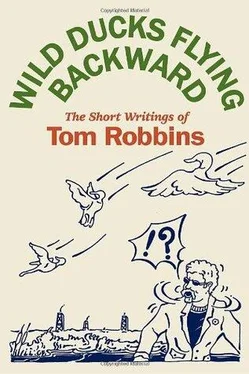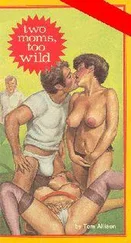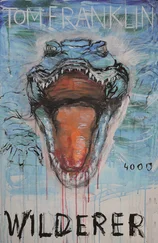Ergo! magazine, 1990
Writing, Wisdom, & The Fabulous Club Gemini
I
It had been a long time since I’d contemplated suicide. In fact, I don’t believe I’d ever before considered the corporal DELETE key an option. Yet there I was, teetering on a bridge high above some oyster-lit backwater from Puget Sound, thinking about closing my earthly accounts with a leap and a splash.
Why? My romantic life couldn’t have been sweeter, my health was close to rosy, the writing was going well, finances were adequate, and while the horror show that that cupidinous cult of corporate vampires was making of our federal government might be enough to drive me to drink (a trip I’m seldom reluctant to take), the political knavery does not exist that could drive me into the drink. No, the truth is, I was being prodded to execute a Kevorkian header into the Stygian slough by a short story I’d just read in a back issue of The New Yorker .
Entitled (ironically enough) Fun With Problems, the piece was composed by Robert Stone, and you can bet it wasn’t Stone’s prose style that had weakened my will to live: the man’s a crack technician whose choices of verb and adjective can sometimes floor me with admiration. He’s a smithery of a storyteller who’s hammered out a stalwart oeuvre — but holy Chernobyl, is he bleak! Stone apparently believes the human condition one pathetically unstable, appallingly corrupt piece of business, and, frankly, at this stage of our evolutionary development there’s a shortage of evidence to contradict him. Nevertheless, I’d always counted myself among those free spirits who refuse to allow mankind’s ignoble deportment and dumb-cluck diatheses to cloud their grand perspective or sleet on their parade. On that day, however, Stone’s narrative prowess had been such as to infect me (unconscionably, I now contend) with his Weltschmerz.
In fairness, Stone alone was not to blame. For too many years my edacious reading habits had been leading me into one unappealing corner after another, dank cul-de-sacs littered with tearstained diaries, empty pill bottles, bulging briefcases, broken vows, humdrum phrases, sociological swab samples, and the (lovely?) bones of dismembered children: the detritus of a literary scene that, with several notable exceptions, has been about as entertaining as a Taliban theme park and as elevating as the prayer breakfast at the Bates Motel. Fun With Problems was simply the final straw, the charred cherry atop a mad-cow sundae.
So, who knows how things might have turned out that glum afternoon had not I suddenly heard, as I flirted with extinction, a particular sound in my mind’s ear; the sound, believe it or not, of a distant kitty cat; a sound that instantly transported me away from the lure of fatal waters, away from the toxic contagions of sordid fiction, and into a place — a real place, though I’ve only visited it in my imagination — a place called the Fabulous Club Gemini.
II
The Fabulous Club Gemini. Where is it, anyhow? Memphis, probably. Or Houston. No, actually I think it might be one of the ideologically unencumbered features of Washington, D.C. In any case, some years back, a music writer for the Village Voice made a pilgrimage to the smoke-polluted, windowless, cinderblock venue, wherever its exact location, and while being introduced to some of the ancient musicians who’d been playing the Fabulous Club Gemini practically since the vagitus of time, the pilgrim became so excited he momentarily lost his downtown cool.
“I can’t believe,” he quoted himself as having gushed, “that I’m talking to the man who barked on Big Mama Thornton’s recording of ‘Hound Dog’!”
“Yeah,” the grizzled sideman drawled. “I was gonna meow —but it was too hip for ’em.”
Okay, perhaps I’m overly fanciful, but I have reason to suspect it might have been precisely an echo from that crusty confession that, as incongruous as it may seem, enticed me down from the kamikaze viaduct. I do know that I’m often reminded of it when I glance at the annual lists of Pulitzers, Booker Prizes, or National Book Awards; when an interviewer’s question forces me to re-examine my personal literary aesthetic; or when speaking with eager students in those university creative writing programs where prescribed, if rarified, barking is actively promoted and any feline departure summarily euthanized.
There’s some validity, I suppose, in the academic approach, for as Big Mama’s accompanist would attest, our culture simply has a far greater demand for the predictable bow-wow than for the unexpected caterwaul: orthodox woofing pays the rent. In a dogma-eat-dogma world, a few teachers, editors, and critics may be hip enough to tolerate a subversive mew, a quirky purr now and again, but they’re well aware of the fate that awaits those who produce— or sanction — mysterious off-the-wall meowing when familiar yaps and snarls are clearly called for.
Let me explain that when I refer to “meowing” here, what I’m really talking about is the human impulse to be playful; an impulse all too frequently demeaned and suppressed in the adult population, especially when it manifests itself in an unconventional manner or inappropriate context. To bark at the end of a song entitled “Hound Dog” is just playful enough to elicit a soupçon of mainstream amusement, but Fred (I believe that was the sessionman’s name), in wanting instead to meow, was pushing the envelope and raising the stakes, raising them to a “hipper” level perhaps, a more irreverent level undoubtedly. There’s a sense in which ol’ Fred was showing a tiny spark of what the Tibetans call “crazy wisdom,” a sense in which he was assuming for a bare instant the archetypal role of the holy fool.
Now, the fact that Fred would have denied any such arcane ambition, the fact that he may only have been stoned out of his gourd at the time, all that is irrelevant.
It’s also unimportant that Fred’s recording studio tomfoolery lacked real profundity, that while it may have been eccentrically playful it was not very seriously playful. What does matter is that we come to recognize that playfulness, as a philosophical stance, can be very serious, indeed; and, moreover, that it possesses an unfailing capacity to arouse ridicule and hostility in those among us who crave certainty, reverence, and restraint.
The fact that playfulness — a kind of divine playfulness intended to lighten man’s existential burden and promote what Joseph Campbell called “the rapture of being alive”—lies near the core of Zen, Taoist, Sufi, and Tantric teachings is lost on most westerners: working stiffs and intellectuals alike. Even scholars who acknowledge the playful undertone in those disciplines treat it with condescension and disrespect, never mind that it’s a worldview arrived at after millennia of exhaustive study, deep meditation, unflinching observation, and intense debate.
Tell an editor at The New York Review of Books that Abbott Chögyam Trungpa would squirt his disciples with water pistols when they became overly earnest in their meditative practice, or that the house of Japan’s most venerated ninja is filled with Mickey Mouse memorabilia, and you’ll witness an eye-roll of silent-movie proportions. Like that fusty old patriarch in the Bible, when they become a man (or woman), they “put away childish things,” which is to say they seal off with the hard gray wax of fear and pomposity that aspect of their being that once was attuned to wonder.
As a result of their having abandoned that part of human nature that is potentially most transcendent, it’s no surprise that modern intellectuals dismiss playfulness — especially when it dares to present itself in literature, philosophy, or art — as frivolous or whimsical. Men who wear bow ties to work every day (let’s make an exception for waiters and Pee-wee Herman), men whose dreams have been usurped either by the shallow aspirations of the marketplace or the drab clichés of Marxist realpolitik, such men are not adroit at distinguishing that which is lighthearted from that which is merely lightweight. God knows what confused thunders might rumble in their sinuses were they to encounter a concept such as “crazy wisdom.”
Читать дальше












